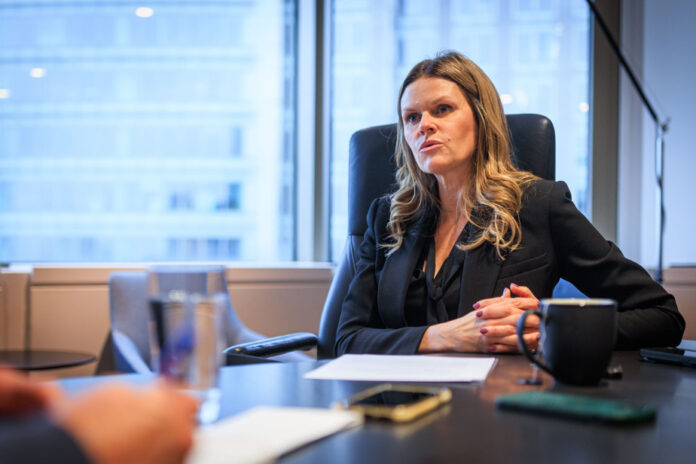Since its founding in 1995, BCF Business Lawyers has given itself the mandate to offer professional services specifically adapted to entrepreneurs who manage privately held businesses. “It has always been in our DNA to support entrepreneurs,” insists the new managing partner, Julie Doré, who joined the young business law firm in 1997.
Julie Doré was recruited by BCF Avocats d’affaires just after leaving Laval University, just two years after the creation of this new law firm in Montreal.
The young commercial law lawyer quickly became a partner at the firm BCF Avocats d’affaires in 2003, but she was promoted to managing partner of the firm last September, becoming the first woman to head the company’s third law office. important business in Quebec.
“We are a young law firm, we are not yet 30 years old, while our competitors have existed for 60, 75 or even 100 years.
“There were only two other associate directors before me, Mario Charpentier, the founder of the group who led the office for 25 years, and my colleague Pierre Allard who was for three and a half years before he decided to return to tax practice,” Julie Doré explains to me in the firm’s offices on the 25th floor of 1100, boulevard René-Lévesque.
BCF Business Lawyers was born from the grouping of eight young lawyers who wanted to get closer to entrepreneurs and found a practice based on their needs, whether in mergers/acquisitions, taxation, commercial law, real estate or intellectual property. .
“We had a boom in the early 2010s when all of Heenan Blaikie’s lawyers from Quebec and some from Montreal joined us. We doubled in size at the time at our Quebec office,” recalls Julie Doré.
In less than 30 years, BCF Business Lawyers has risen to third place among the largest specialized law firms in Quebec, behind Fasken and Norton Rose. The Montreal office has 450 people, including 220 professionals, and the Quebec office has 100 people, including 50 professionals.
“Mergers/acquisitions, taxation, real estate and banking law as well as commercial law represent 60% of our activities, while commercial and corporate litigation, claims, intellectual property and business immigration make up the Remaining 40%,” emphasizes the managing partner.
The legal profession is increasingly embraced by women, who make up nearly 75% of law school cohorts. This reality is also observable at BCF, which today has 40% female partners and 59% female lawyers.
“I’m not the first woman to run a major office. Kim Thomassin was a director at McCarthy Tétrault before joining the Caisse de dépôt, and Anik Trudel heads Lavery. In this industry long dominated by men, today we feel the opposite movement,” observes Julie Doré.
Specializing in commercial law, Julie Doré has acquired expertise in real estate development over the last ten years, where she has been associated with large projects, such as Solar in Brossard or Le Maestria and Humaniti in Montreal.
“Now I’m less into delivery. BCF is a big company, and I take care of business development. From 2017 to today, we have increased our revenues by 50%, and there, we are working on the quality of our growth,” explains Julie Doré.
“We work a lot on artificial intelligence. Our intellectual property group is very helpful in this regard. For many of our clients, AI is a huge challenge from a legal, operational or human resources point of view. There is no case law. How do you allow your employees to use it? », evokes the director.
Among the other issues that will monopolize the firm’s energy and talents, we obviously find the energy transition and major infrastructure projects which will multiply over the coming years and which are often the subject of litigation.
Unlike other large business law firms, BCF has never felt the need to partner with firms outside Quebec to support its clients.
“We have developed alliances with independent offices like us elsewhere in Canada or abroad. We work closely with them, and this even provides us with referencing,” underlines Julie Doré.
Likewise, BCF suffered much less from the drop in activity in terms of mergers and acquisitions or listings of public companies that we have observed since the 2008-2009 crisis.
“We support medium and large closed-end companies in their development. There are a lot of transfers of ownership to the children of founders or sales to employees or buyers from abroad. We are always looking to better support our client companies,” insists the managing partner.















